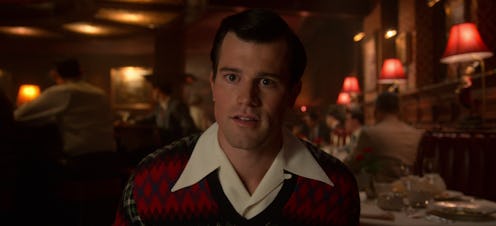Entertainment
'Hollywood' Shows "How Everything & Nothing Has Changed," Says Star Jake Picking

On the outside, movie star Rock Hudson was the epitome of a '50s-era heartthrob: clean cut, classically handsome, and so successful that he was considered the "king of Hollywood." Inside, however, he was harboring a secret: he was a closeted gay man, unable to live openly because of homophobia within the film industry. It wasn't until 1985, when he died of AIDS-related complications at 59, that his sexuality became public. Living a lie for all of those years, Jake Picking imagines, must have felt terribly lonely.
"I read somewhere that a secret isn't really a secret unless it's painful to hold on to," the actor, who plays Hudson in Netflix's Hollywood, tells Bustle. "And I feel like that's what he had to do with all that he was holding on to."
Hudson's struggles with his sexuality were only part of what made him a tragic figure: he also came from a troubled upbringing. Hudson was 5 years old during the height of the Great Depression when his father lost his job, prompting him to leave his life and family in Illinois for California in search of work. Two years later, Hudson and his mother took a bus trip halfway across the country to ask him to come home. Hudson's father refused.
"I can't even imagine that bus ride back home, just feeling rejected in one of many ways," Picking says. "And that's what the tragedy of Rock is."
Picking connected with that feeling of isolation. A Boston native, he was only a year into NYU's business school when he dropped out to pursue acting and moved to Los Angeles, where he initially felt a "kind of existential angst." Similarly, Hudson traded a quiet life in Illinois and a career in the military in order to move to Hollywood and work as a truck driver, hoping to break big. "I think making a conscious choice to go after something, to kind of leave everything behind was something I related to," Picking says.
As with many of its characters, Hollywood attempts to rewrite history for Hudson. When he's first introduced, he's a timid aspiring actor uncomfortable in his own skin. He meets screenwriter Archie Coleman (Jeremy Pope) at a gas station that doubles as a male brothel, wanting to explore his sexuality in secret. But as the men fall in love, Hudson evolves into a more confident, assertive man: at the end of the season, he stands up to his manipulative manager and walks a red carpet with Archie hand in hand, coming out to the world despite the risk it poses to his career.
"I think [it's] empowering and something that so many people can root for," Picking says of Hudson's fictional coming out. "It's such a hopeful and triumphant show."
But as hopeful as Hollywood's depiction of 1940s Tinseltown is, the show also shines a spotlight on issues still prevalent today. Hudson's agent Henry Willson (Jim Parsons), for example, is sexually predatory and emotionally abusive.
"I think [Hollywood] shows how everything and nothing has changed," Picking says. "Unfortunately, the abuse of power is relevant. It's a battle that's still being waged against people of color, women, and members of the LGBTQ community ... That's why you really feel empathy for these characters and really root for them to have a happy ending."
In Hollywood, at least, Hudson does.